
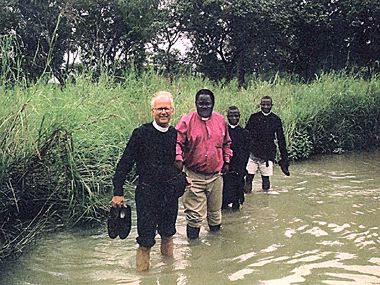 |
IN NIGERIA Christmas will be a solitary time for many missionaries, says Tad de Bordenave, director of Anglican Frontier Missions, fording a stream with Bishop Joseph Akinfenwa of the Diocese of Ibadan. |
Far from home
Many will celebrate the Christmas season
and share faith in new cultures
By MICHELLE GABRIEL
for Episcopal Life
ALONG WITH SPICY-SMELLING pine trees, glowing Advent candles and
choirs singing "Silent Night," family gatherings are among the
most anxiously anticipated activities of the Christmas season.
But worldwide, people are celebrating the holidays achingly far
from home. For many, the separation is self-imposed; they are
missionaries and chaplains who spend much of the year in war-torn
or poverty-stricken countries, sharing their faith with people
who might otherwise lose hope.
While their daily experiences can be trying, many ministers and
missionaries find the holiday season to be a special challenge.
Some must find ways to incorporate their familiar traditions into
those of a new culture; others are preparing to celebrate Jesus'
birth in unconventional settings. Some find their new communities
cannot afford to prepare for Christmas festivities, while others
are forced to celebrate in secret. Some are refugees or families
displaced by war, their hearts longing to spend Christmas with
their friends and loved ones back home.
While these Episcopalians are immersed in different cultures and face drastically different daily challenges, their strong faith and enduring spirits shine most brightly during the holidays. Whether they live in the Holy Land or Cape Town, in each there gleams a Christmas star, a shining light leading their neighbors to Christ.
'We won't be thinking about presents'
 Col. Frank Wismer will celebrate Christmas Eucharist in the ornate
palace where Saddam Hussein lived before being driven out by U.S.
troops early this year.
Col. Frank Wismer will celebrate Christmas Eucharist in the ornate
palace where Saddam Hussein lived before being driven out by U.S.
troops early this year.
The service will take place in the room named for the biblical
"city of peace" -- Hussein's Jerusalem room, so-called because
of the murals on the walls and ceilings depicting scenes of the
holy city.
Wismer, a senior army reserve Episcopal chaplain, is on an extended
assignment in Baghdad, where he has lived since retiring from
St. Michael's Church in Worcester, Mass. His congregation is a
blend of servicemen and civilians, of Iraqi, American, British,
Spanish, South African and Korean worshipers.
While the congregation at a typical Diocese of Western Massachusetts
church would arrive at a Christmas service dressed in their holiday
best, Wismer said his group would wear desert fatigues, pistols
still attached. Some will have their rifles in hand.
The service will be a mix of languages and cultures, Wismer said.
A Fijian men's choir will sing in the choristers' native language.
Readings will be in Arabic and English.
Wismer said he had forged strong ties while serving a country
struggling to stagger to its feet -- ties that go far beyond the
people with whom he worships each week.
"On Christmas day, a unique bond will develop between us and all
those military personnel who have been deployed away from home
in war zones over the years," he said. "We will become mystically
connected to those who spent the Christmas of 1944 in the Ardennes
and those who spent the Christmas of 1969 in the jungles of Vietnam."
But thoughts of home will weigh on his spirit, Wismer said.
"We'll have a wonderful turkey dinner with all the fixings and,
as we sit down together at the table, we'll make small talk, but
our minds will be focused upon our loved ones at home," he said.
"We won't be thinking about presents or Christmas trees."
Although his holiday feast may be devoid of more traditional Christmas
trappings, Wismer said, Christmas spirit will be abundant.
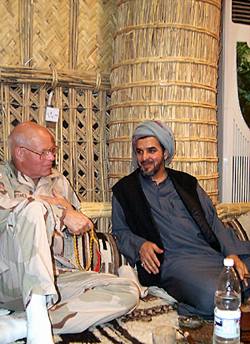 |
| IN IRAQ Col Frank Wismer, a senior Army reserve Episcopal chaplain in Baghdad, talks with a Sufi cleric, the grandson of Ayatollah Khomeini, at iftar, a feast to end the day of fasting. |
"We will be marveling at all the gifts we already enjoy, the simple
things like an abundant life full of promise and opportunity,"
he said.
His Christmas will be particularly special as he watches his new
congregation -- worlds away from his former parish in Massachusetts
-- celebrate its first Christmas, Wismer said.
"I will be the only non-Arabic-speaking person at prayer on Christmas
Day, and yet, I will feel at home with my Iraqi brothers and sisters
in Christ," he said. "Though the congregation is not yet four
months old, [the church] will be packed. There will be 70 or 80
children in attendance, and they will fill my day with joyfulness."
But Wismer knows many Americans who lost loved ones in Iraq will
face the most difficult holidays of their lives -- and that the
real spirit of Christmas can prevail only when combat is truly
over.
"Christmas will be a most blessed day when, at the end of it, I can update my journal by saying that no one died in combat operations," he said. "Christmas will be a wonderful day when I learn that no family at home was notified on Christmas morning that a loved one was killed here in Iraq, the 'cradle of civilization.'"
'My hands will be aching to spread joy'
Wilbert Clarke, a businessman, who serves on the board of directors
of the Liberian Episcopal Church, will spend the weeks leading
up to Christmas in Monrovia, the capital of the war-torn country.
Clarke and his family lived in the turbulent country before they
fled to the United States and settled in New Jersey. Now, Clarke
returns to his former home to help rebuild his country, at once
separated from his family in America and embraced by the community
that was once his own.
After more than a decade of devastating civil war, the nation's
tumultuous politics are yielding to a more peaceful way of life.
But the destruction and grief of the years of war will bring a
Christmas of both abundance and loss.
"This Christmas, after at least one decade of open civil war,
the hope of Liberians will be mixed with heartaches, their song
made hollow by suffering and low-keyed strife," Clarke said.
He noted that battles still raged in Liberia, even after former
President Charles Taylor stepped down in August. Soldiers and
rebels also are exploiting and stealing from the weak, he said.
But, in the true Christmas spirit, the Liberians' hope never fails,
Clarke said. Although they remain far from being freed from oppression,
the Liberians will celebrate Christmas in a new nation.
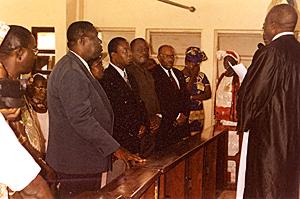 |
| IN THE UNITED STATES Wilbert Clarke, a businessman from Monrovia, Liberia, will find himself and his family in Princeton, New Jersey, this Christmas, but says his heart will be with his fellow countrymen as they celebrate the holiday in a nation now freed from oppression. Above, Clarke, third from left, is sworn in as a board member of the Episcopal Church in Liberia. |
"Christmas is expected to underscore their enthusiasm for that
liberty and unity which only the Lord of truth and peace can give,"
Clarke said. "It is always heartening to see the soul of joy Liberians
would show despite the hardest trials and the sternest suffering."
This year, Clarke said, he will return to America and celebrate
the holidays with his family.
"But my yearning will be to stand with the armies of Christians
in Liberia, not celebrating in songs, but ministering in the provisions
of peace," Clarke said. "My heart may be singing this Christmas,
here there or yonder, as God wills, but my hands will be aching
to spread joy around the world."
'The simplicity of it was beautiful'
Many Episcopalians sent to serve overseas as missionaries experience
far different Christmas celebrations while abroad, said the director
of the church's mission personnel office, the Rev. Jane Butterfield.
But they also can be more profound, she said.
Almost everyone sent on a mission serves in a poor country, which
drastically affects the trappings of the worship service, she
said. Their budgets don't allow for glittering trees dripping
with ornaments or Christmas pageants featuring ornate costumes.
The focus is on worshiping the Christ child's birth as a community.
"Many missionaries remark on how being in that kind of situation
makes vivid the reality that Jesus came into a community of poverty
and simplicity," Butterfield said. "They have a much more vivid
sense of the incarnation than ever before. There is very little
emphasis on gift-giving."
This was especially true for Butterfield herself when, as a young
mother of four, she and her family spent Christmas as missionaries
in rural Zimbabwe.
"We had a big village Eucharist where people from all over the
village came by," Butterfield said. "The simplicity of it was
beautiful."
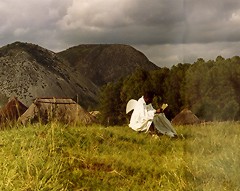 |
| IN ZIMBABWE A typical Nativity play in rural Zimbabwe took on new meaning for the Rev. Jane Butterfield, her clergy spouse, Titus, and children. At left, a young Zimbabwean who plays the Angel Gabriel rehearses his lines. |
The highlight of the day was a nativity play the village children
acted out, she said. They performed the play in the middle of
the village, with vibrant poinsettias blooming everywhere.
"The young Shona children absolutely love putting on plays, so
there was much singing and laughing," she said. "It was a typical
nativity play except it was much more fun ... lots of joy. The
young woman who gets to play Mary is very special and feels quite
honored. And the baby is always a real baby."
Butterfield said the Christmas story took on deep meaning in the
village that embraced her family that holiday season. "All these
rural, subsistence farmer people that are so like Mary and Joseph.
... They relate to the story immediately."
When Butterfield lived in Zimbabwe, the country had been free
for three years from oppressive minority rule. For a newly free
people, Butterfield said, "re-incarnating the Jesus story ...
wasn't, for them, a stretch."
"For our children," she added, "it was an opportunity to see just how Jesus came into the world."
'It becomes real in a different way'
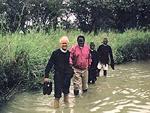 For some missionaries, Christmas will be a solitary time, marked
only by packages from home or occasional phone calls, said Tad
de Bordenave, executive director of Anglican Frontier Missions.
For some missionaries, Christmas will be a solitary time, marked
only by packages from home or occasional phone calls, said Tad
de Bordenave, executive director of Anglican Frontier Missions.
Missionaries from Anglican Frontier Missions serve in "high-risk"
areas, such as Asia and the Middle East, and many must cloak their
celebrations from potentially hostile community members, he said.
In this holiday season, support comes mainly from family and friends
back home.
De Bordenave said he encourages members of the missionary's home
parish not only to send packages, but also to call when the holidays
draw near.
He said his missionaries' communities -- all non-Christian --
react to Christmas celebrations with hostility, curiosity or indifference.
Adverse reactions to such a meaningful holiday can make Christmas
difficult for missionaries, and friendly greetings are some of
the most treasured gifts.
But some celebrations can be "enormously enriching" for the missionaries,
de Bordenave said.
"Missionaries develop deep respect in the [new] culture," he said.
"Because the people we work with are never Christians, there have
often been opportunities for missionaries to invite the people
they live with into their homes. It is often the first time that
the non-Christians get a glimpse of Christianity."
"It's not teaching, and it's not a Bible study," he said. "It is rehearsing the events of the birth of the Messiah, and it becomes real in a different way."
'A perfect place to spend Christmas Eve'
The city where Christ entered the world is in an area marked by
devastating conflict -- the struggle between Israelis and Palestinians.
Nancy Dinsmore, a missionary in Jerusalem, will celebrate Christmas
Eve with a diverse group of worshipers. Christian, Muslim, Jewish
-- including a few Palestinian Christians who are allowed to visit
Bethlehem -- will worship together at the church said to be built
where Jesus was born.
"It is a deeply spiritual place for me," Dinsmore said. "As I
say prayers, sing Christmas carols and light candles, I cannot
think of a more perfect way to spend Christmas Eve."
Dinsmore said her Christmas prayers this year would be for peace,
"most especially in the Holy Land, which is my home."
'One chair at the table is left vacant
for those who are absent'
The unique experience of celebrating Christmas with a foreign
community endures a lifetime, said Denise Cox, missionary partnership
coordinator for the South American Missionary Society.
Cox has fond memories of a trip to Venezuela 20 years ago. Christmas
is a day of rest for Venezuelans. Throngs of Christmas Eve shoppers,
a sumptuous midnight meal and a gift exchange marked the holiday's
celebration.
A missionary couple from the society, Juan and Maria Sanchez from
Colombia, celebrate their Christmases where they serve in Honduras
in a memorable way, Cox said.
"Juan directs a nativity play. Then, after the service, he invites many people back to the couple's home for dinner," she said. "One chair at the table is left vacant as a reminder of those who are absent -- family members and friends in Colombia and individuals who support their missionary work."
'We haven't the time to
think about Christmas'
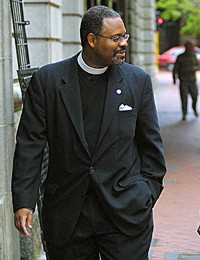 |
| IN SOUTH AFRICA Walter Brownridge and his wife, Tina Nader, say they are learning invaluable lessons about Christian love and charity in their first Christmas ever outside of the United States. |
"We haven't the time to think about Christmas," they wrote in a letter about their experiences in Cape Town. "The poverty in Africa is incomprehensible."
Brownridge and Nader may not exchange traditional gifts this December, but they say they are learning invaluable lessons about Christian love and charity.
Faced with a constant stream of impoverished beggars that go door-to-door pleading for food and money, Brownridge and Nader know they cannot give to everyone. But they realize they can share a smile and a prayer with those in the deepest distress -- an uplifting gift of love and peace.
And what better gift to give on Christmas than what the Christ
child gave the world?
|return to top of page |home |contents |archives
|to subscribe |staff-partners |to reach us
|about episcopal life |to advertise |promotions |exit